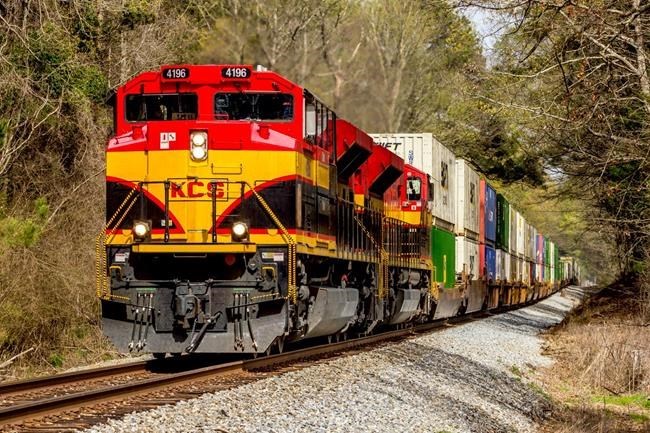CALGARY — The U.S. rail regulator is giving a green light to Canadian Pacific Railway Ltd. to take control of Kansas City Southern Railway Co. as early as April 14.
The Surface Transportation Board's approval Wednesday clears the final hurdle in CP's bid to buy KCS for US$31 billion in a deal that would create the only single-line rail network linking Canada, the U.S. and Mexico.
The merged railway will be named Canadian Pacific Kansas City, with current CP chief executive Keith Creel as CEO and Calgary as the global headquarters.
STB chair Martin Oberman said the regulator has concluded the merger is consistent with the public interest. He pointed out that while consolidation in the rail industry has been a concern over the last few decades, CP and KCS are actually the two smallest of North America's Class I railways — making the risk that the deal will reduce competition less of a concern.
He added the merger is also "end to end," meaning there are few overlapping routes between the two railways. He said the deal is expected to speed up freight travel time, enhance efficiency and allow for better competition with the other five, larger U.S. railways.
"Putting these two small railroads together will actually provide a stronger competitive landscape in the rail industry, vis-a-vis these much larger railroads," Oberman told reporters Wednesday.
"Because separately, these railroads just don't have the same oomph and power in providing competitive service as they will together."
The STB received more than 450 letters of support from rail shippers for the transaction, Oberman said, adding customers expect the merged CP-KCS to be a more reliable and economical transportation option serving critical north-south trade flows.
The regulator was also influenced by the argument that the merger will ultimately foster the growth of rail traffic, potentially shifting up to 64,000 truckloads annually off of highways onto trains and helping to reduce greenhouse gas emissions.
And given last month's fiery train derailment near East Palestine, Ohio — which has once again thrust rail safety into the spotlight — Oberman said the STB is also encouraged by the two companies' strong performance record.
"When you look at the safety records of all the Class I railways, CP has the safest record, and KCS is just behind it," he said.
However, the regulator did attach conditions to the deal, including that the newly merged railway keep gateways — connection points between the CPKC system and other railroads — open on "commercially reasonable terms," and to justify in writing any rate increases over a certain level on interline movements.
While it will remain the smallest of six large railways in the U.S. by revenue, the new Canadian Pacific Kansas City will operate nearly 33,000 kilometres of rail and employ nearly 20,000 people.
On Wednesday, CP CEO Keith Creel thanked the STB for their hard work in reviewing the deal, and said the railway will announce its next steps in the coming days.
"This decision clearly recognizes the many benefits of this historic combination," Creel said in a news release. "As the STB found, it will stimulate new competition, create jobs, lead to new investment in our rail network, and drive economic growth."
CP's main competitor, Montreal-based Canadian National Railway Co., declined to comment Wednesday. CN had fought a long and protracted battle over the acquisition before CP closed its proposed deal in December 2021.
CP and KCS first announced a friendly offer in March of 2021 after a behind-the-scenes duel over the U.S. railway.
KCS then switched alliances a month later by declaring CN's cash-and-stock bid valued at US$33.6 billion as superior.
However, KCS's affection for CP returned after the U.S. transportation regulator denied CN's use of a voting trust for KCS, saying it would be bad for competition.
CP, which already had permission to use a voting trust under older rules, was able to close its proposed deal on Dec. 14, 2021. Since then, the shares of KCS have been in a voting trust that allows the U.S. railway to operate independently while the Surface Transportation Board completed its review.
This report by The Canadian Press was first published March 15, 2023.
Companies in this story: (TSX:CP, TSX:CNR)
Amanda Stephenson, The Canadian Press




